




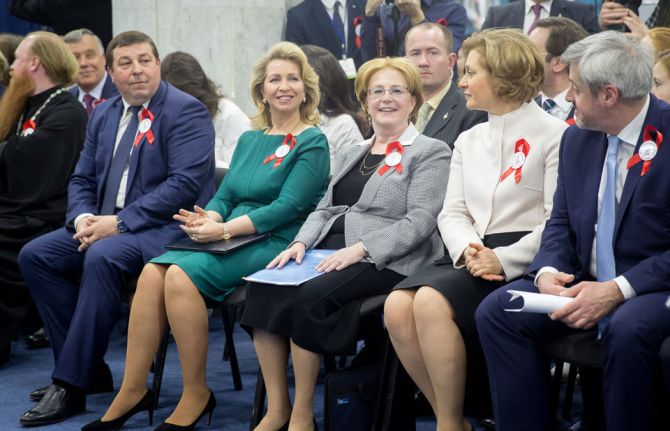



Update
#STOPHIVAIDS in the Russian Federation
26 May 2017
26 May 2017 26 May 2017A third #STOPHIVAIDS week has been held in the Russian Federation. Students, medical personnel, artists, athletes, religious leaders and young people came together for a week-long campaign from 15 to 21 May to promote free HIV testing and take part in flash mobs, trainings and sports competitions across the country to raise awareness about HIV.
Information about HIV was promoted by some of the country’s leading celebrities on national and regional television channels, while social media and private sector companies distributed campaign materials.
The #STOPHIVAIDS campaign is part of the Russian Government’s State Strategy and Implementation Plan on HIV in the Russian Federation until 2020 and beyond. The campaign was initiated by Svetlana Medvedeva, spouse of the Russian Prime Minster and Head of the Foundation for Social and Cultural Initiatives. The campaign was implemented with the active support of the ministries of health, education and communications, the Russian agency for consumer protection, Rospotrebnadzor and the Russian agency on youth affairs, Rosmolodezh, among others.
Quotes
“I am confident that by joint efforts of the state and society, we will achieve the goal to stop the spread of HIV infection in our country..”
“In 2016, the coverage of HIV testing and treatment coverage of people living with HIV increased. We are on the vector to reach 90% of people living with HIV with treatment and are moving towards this goal.”
“This timely campaign demands that all aspects of Russian society—the government, regions, civil society and international partners—unite to transform the new HIV strategy into results. UNAIDS is proud to support such a sustained campaign that transforms the end of AIDS into an urgent priority.”
Region/country
Related

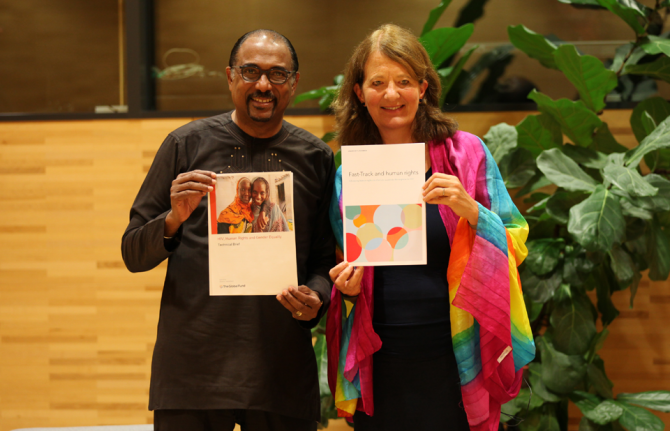
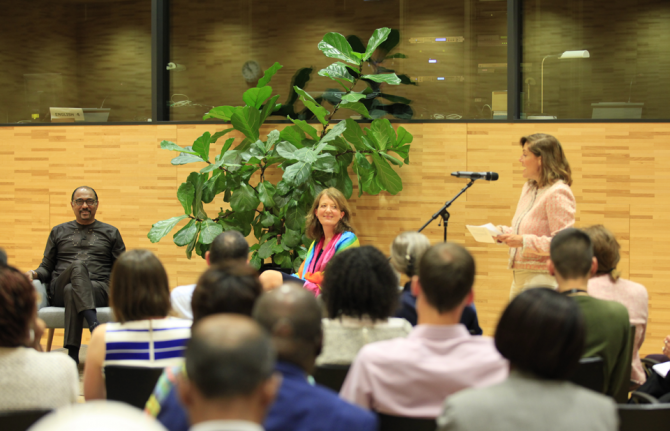
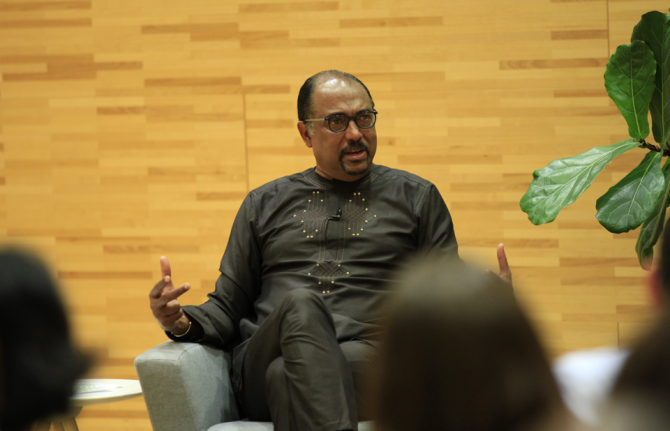
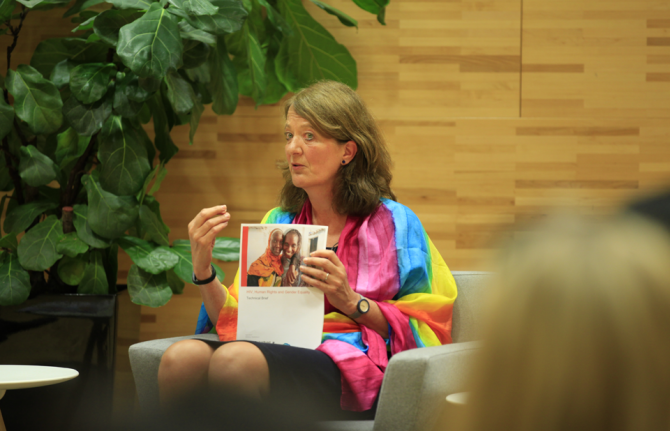
Update
UNAIDS and the Global Fund launch guidance on HIV human rights programmes
27 May 2017
27 May 2017 27 May 2017To support countries to integrate human rights principles in their HIV prevention, testing and treatment programmes, UNAIDS and the Global Fund to Fight AIDS, Tuberculosis and Malaria (Global Fund) jointly launched two mutually supportive technical documents on 29 May.
The UNAIDS guidance document Fast-Track and human rights offers practical advice on why and how efforts to Fast-Track HIV services should be grounded in human rights principles and approaches. It includes three checklists to support and guide the design, monitoring and evaluation of HIV services in order to realize human rights and equity in the AIDS response.
The Global Fund technical brief HIV, human rights and gender equality supports grant applicants to include programmes to remove human rights and gender-related barriers to HIV services. It also gives advice on implementing human rights-based and gender-responsive approaches to HIV.
Together, the documents will inform the development of Global Fund concept notes, national Fast-Track plans and other work to accelerate the response to HIV. They will provide practical guidance to national policy-makers, HIV programme implementers, communities, civil society organizations, the United Nations and donors as they design, oversee, fund, monitor and implement efforts to Fast-Track HIV programmes.
Quotes
“We must go beyond talking about HIV-related discrimination and human rights violations. Now is the time to act and support governments, civil society and affected communities to respond to these challenges through programmes to advance human rights, dignity and equity.”
“Under its new strategy, the Global Fund is committed to reducing human rights-related barriers to HIV, tuberculosis and malaria services. We need to do this because it is the right thing to do, but also because it will increase the impact of our investments. We are taking a practical, pragmatic and programmatic approach, and this means ensuring countries vastly increase investment in the seven key programmes to reduce stigma and discrimination and increase access to justice that our new technical brief and the UNAIDS guidance document describe.”
Related

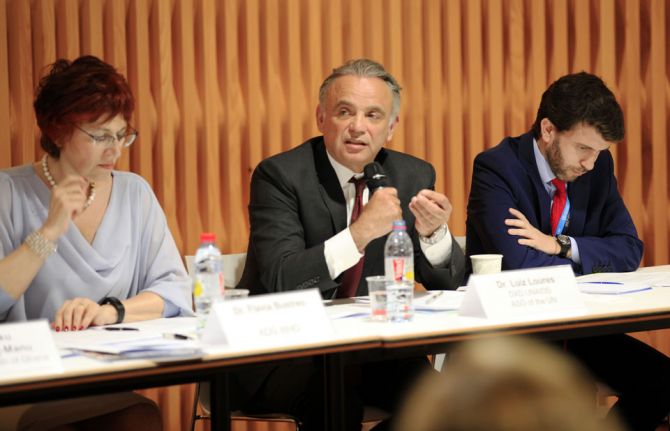
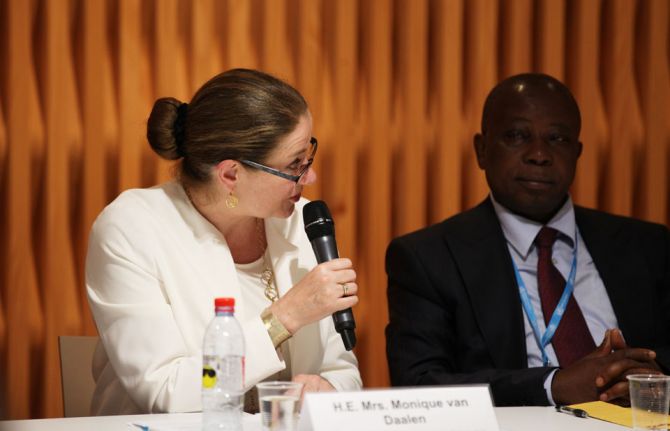
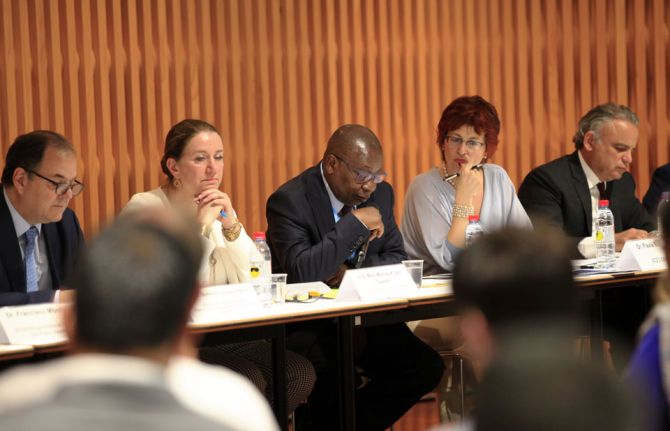
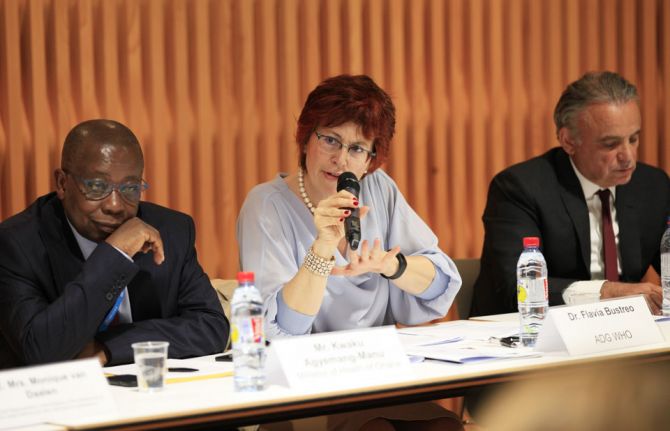
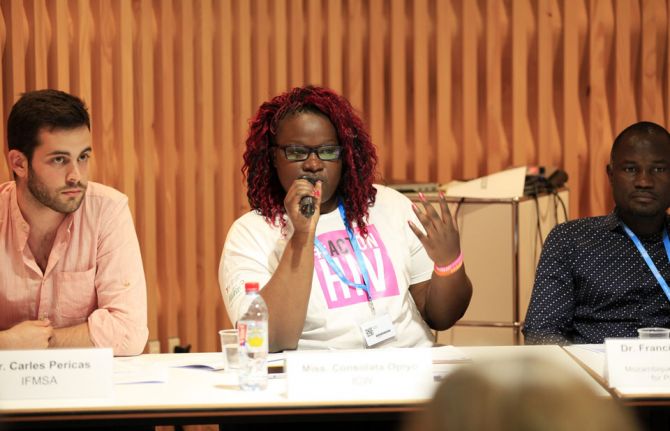
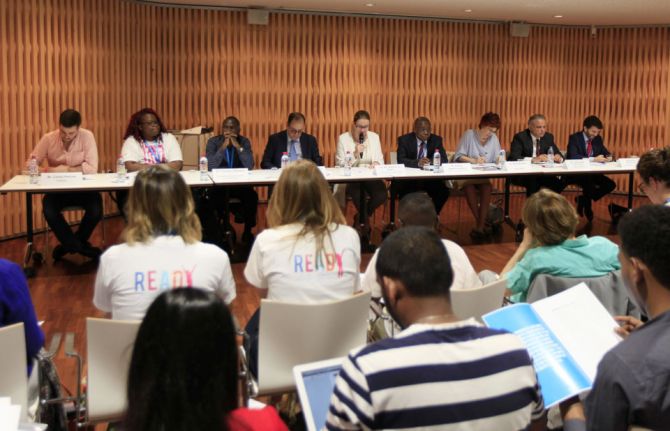
Update
Stopping discrimination in health care
27 May 2017
27 May 2017 27 May 2017Representatives of governments, international organizations and civil society have called for intense joint efforts to be made to eliminate discrimination in health-care settings. The call was made at an event entitled Catalysing Global Action to Stop Discrimination in Health Care, held on 25 May on the margins of the 70th World Health Assembly.
More than 100 participants attended the event, who agreed that stopping discrimination in health care is necessary for achieving universal health coverage, ending AIDS and guaranteeing healthy lives for all. Health-care settings are among the most common environments in which people experience stigma and discrimination, which leaves people behind and compromises health and social justice.
The participants committed to championing the Agenda for Zero Discrimination in Health Care, with the aim of securing political leadership, scaling up the implementation of comprehensive interventions and enhancing accountability.
Quotes
“Stigma and discrimination remain an unfortunate reality in many countries. Governments must fight all forms of discrimination and work for the well-being of all their citizens. In Ghana, innovative strategies have been introduced to eliminate discrimination and strengthen accountability.”
“Ending discrimination in health care is vital for achieving the Sustainable Development Goals and ending AIDS, TB and hepatitis. Stigma and discrimination are obstacles to effective health responses in any country, region or context, and need to be addressed in dialogue with the people affected.”
“The sustainable development agenda is a journey to social justice and inclusion. It is premised on eliminating inequalities and discrimination. We have dual epidemics today, of diseases and discrimination. Join forces, become a champion for zero discrimination in health care!”
“The 2030 Agenda gives urgency for upholding the right to health of everyone, without any discrimination, in every part of the world. We need to lead together on the realization of the human rights to health through health.”
“Patients need to become impatient. We need to claim our rights and demand accountability. If we are not aware of our rights, we cannot get angry enough to challenge the entrenched discrimination. We are entitled to quality health care.”
Related

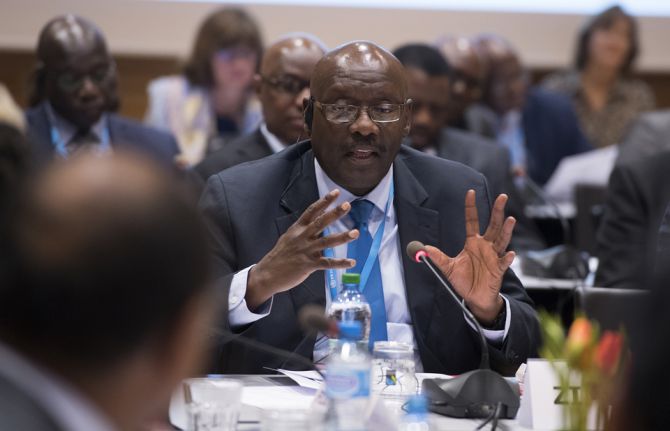
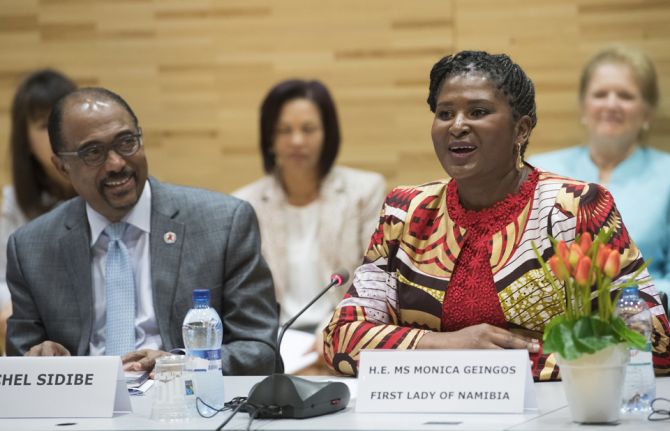
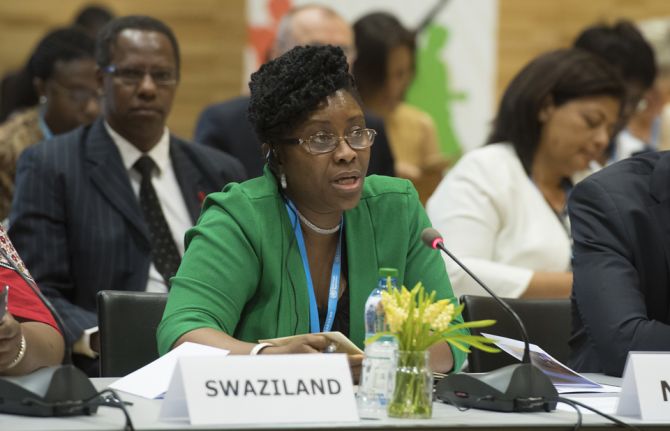
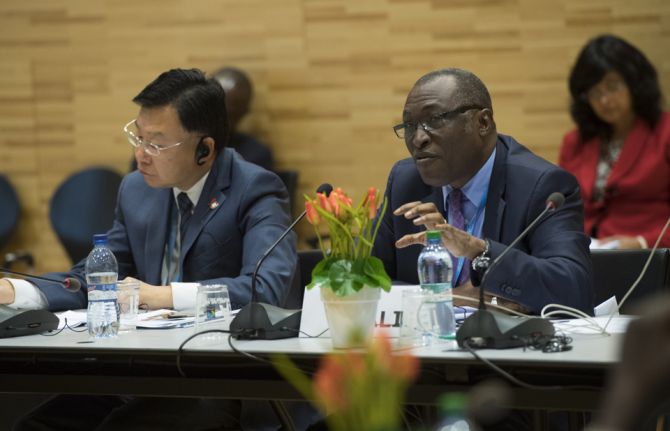
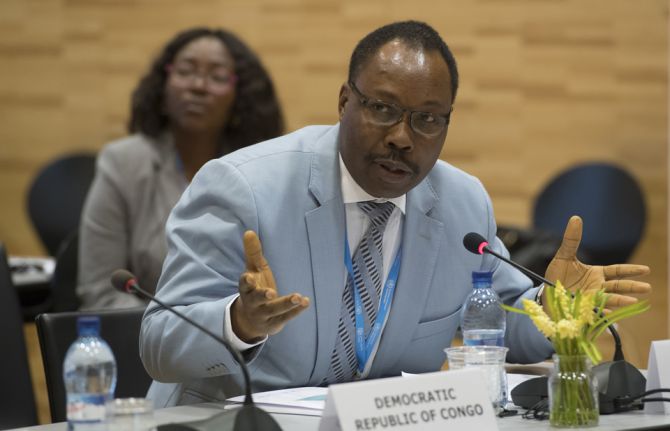
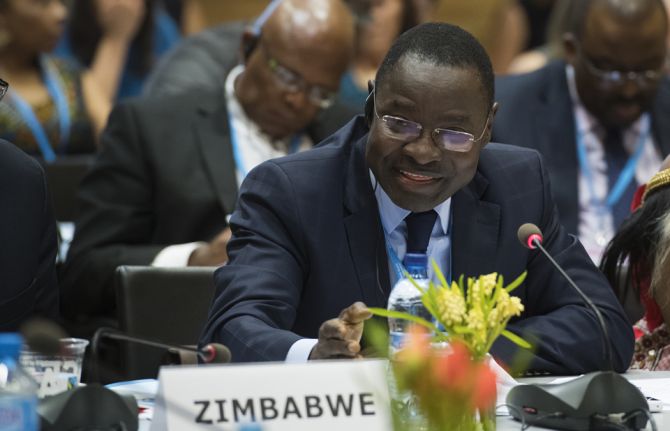
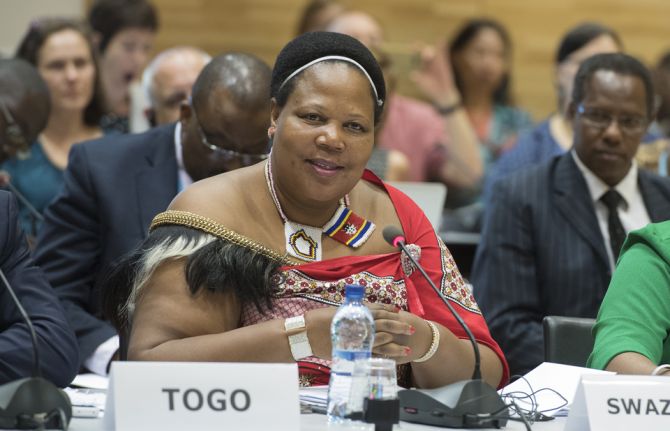
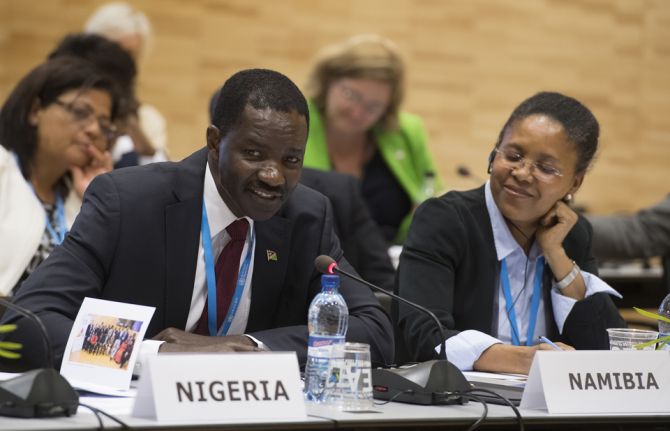
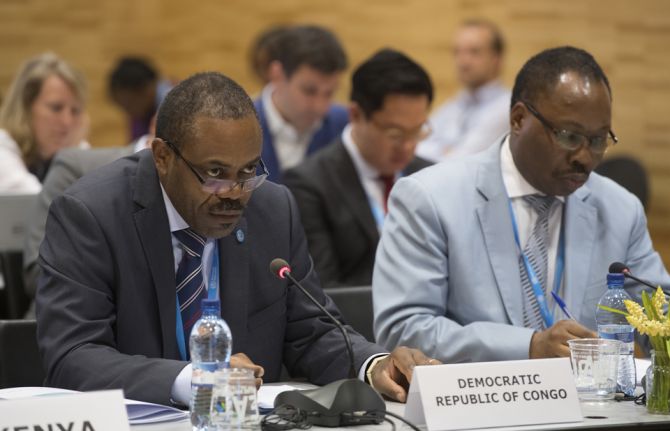
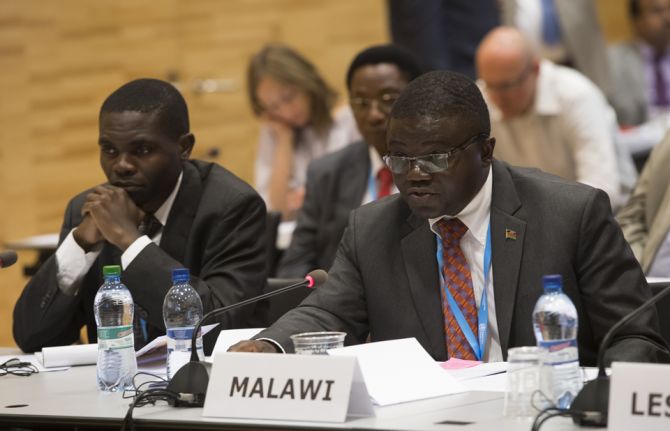
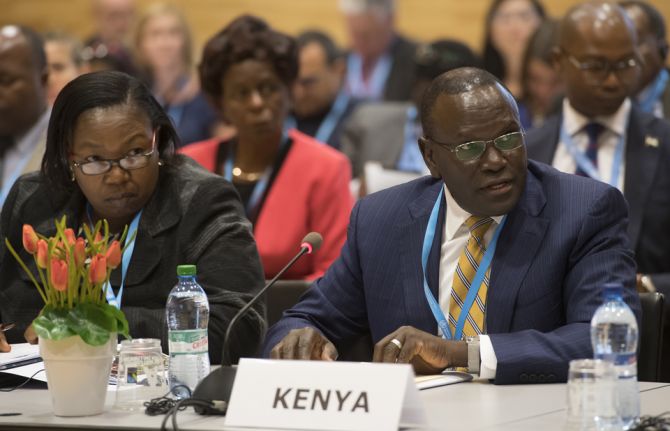
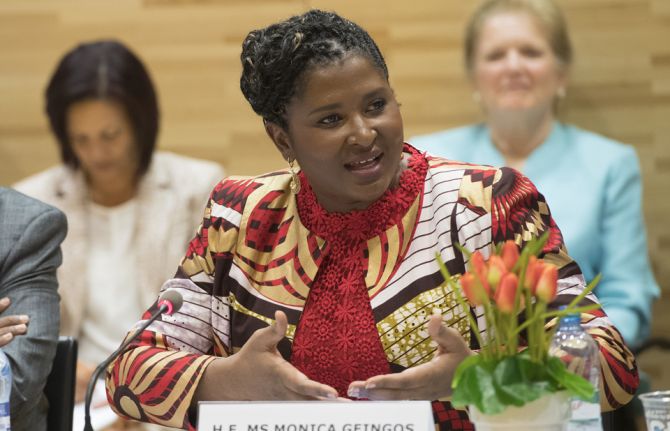
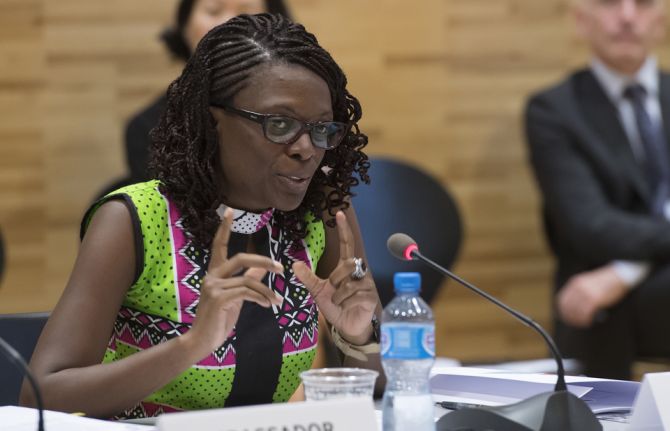
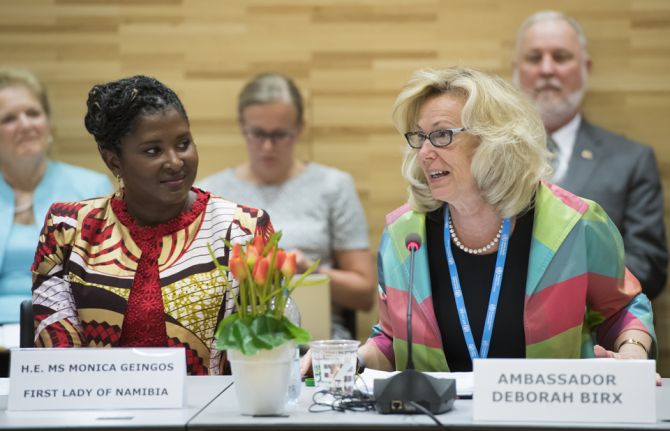
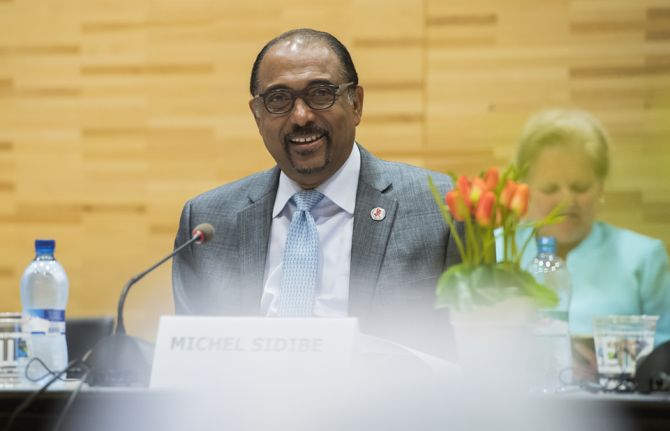
Update
Stay Free proving a challenge in many countries
24 May 2017
24 May 2017 24 May 2017UNAIDS and the United States President’s Emergency Plan for AIDS Relief have convened a ministerial meeting to review progress in implementing the Start Free, Stay Free, AIDS Free framework on 24 May. The meeting, sponsored by Lesotho, Malawi, Swaziland, and the World Health Organization was held on the sidelines of the 70th World Health Assembly.
The First Lady of Namibia and UNAIDS Special Ambassador for Young Women and Adolescent girls, Monica Geingos, was a special guest at the meeting. She gave an inspiring keynote speech that set the tone of the meeting, in which she emphasized the need to change the way we speak to young people and train the people who are educating them on sex and HIV, including teachers and grandparents.
“We’ve done so much great work on the Start Free, but there’s something wrong on the Stay Free,” said the First Lady. “Young people have changed the way they talk and we need to speak their language so we can reach them in a way they can relate to.”
Florence Anam, from the International Community of Women Living with HIV, shared her own personal experience and talked about health systems that are ill-equipped to deal with teenagers and teenage pregnancy. She said, “We need to invest in networks of women living with HIV and build our capacity to contribute to and engage with actions that impact on our lives.” She also talked about the need to involve men and create initiatives for greater male engagement to promote shared responsibility.
The common theme of the meeting was the agreement that excellent work has been done to stop new HIV infections among children, but that adolescents have been left behind and a new approach is needed to reach and engage them in staying free from HIV.
“We will never be able to control and end this epidemic if we don’t think ahead,” said Michel Sidibé, Executive Director of UNAIDS. “This means not just thinking about starting free and giving babies a chance to be born free, but also making sure that they stay free.”
“We are nothing without the scientific evidence, but it cannot be translated into programmes without communities and political leadership,” said Deborah Birx, United States Global AIDS Coordinator and Special Representative for Global Health Diplomacy.
Ministers of health and representatives of Cameroon, the Democratic Republic of the Congo, Kenya, Lesotho, Malawi, Mali, Namibia, Nigeria, Swaziland, Togo and Zimbabwe joined the Executive Director of UNAIDS and the United States Global AIDS Coordinator to look at some of the challenges they are facing in scaling up HIV prevention and treatment, as well as to share some of the success stories from their respective countries.
They were asked to describe what was the one most important action they were initiating under the Start Free, Stay Free, AIDS Free agenda. Below are some of the highlights of their responses.
Quotes
“One of the interesting approaches we took in the Democratic Republic of the Congo was a programme where the distribution of antiretroviral medicine was done by people living with HIV. This helped decrease stigma, give easier and faster access to treatment and increase adherence. It also freed up health facilities and gave health workers an opportunity to concentrate on new patients and cases needing specialist medical attention.”
“There is an urgency to act responsibly towards ensuring babies are born free of HIV and protecting those babies into adolescence. It's not a matter of programming, but taking the responsibility to make the right choices.”
“Today we have implemented up to 99% of antiretroviral medicine coverage among pregnant women living with HIV but as a minister I’m not happy with 99%. The best measure is the number of children born without HIV. We want the entire country to be HIV-free.”
“Start Free is the order of the day. We have mobilized leaders, empowered young people and focused on reaching pregnant women. Stay Free is the challenge. We have to change the way we speak to young people and make sure that our HIV prevention programmes are led by young people.”
“In Zimbabwe, we have looked at two things: prevention and treatment. If you want to do treatment, do treatment, it’s very good. But if you don’t turn the tap off on new infections, then you have a problem. This is why for Zimbabwe its prevention, prevention, prevention.”
“We have raised political awareness, scaled up HIV testing, but we have a problem of stock-outs and loss to follow-up for which we would like to find solutions.”
“We need to work together and to be accountable, we need all partners, including non-governmental partners, to work hand in hand. We can't do it without our partners—it’s the only way we can accelerate our response.”
“We have mobilized both financial and human resources. Our programmes are being driven by community health workers. They are our solution to our engagement with communities.”
“We have made a certain amount of progress and our objective is to continue along this path. It is important that we don’t let our guard down. We also want to recognize the accomplishments made by our partners, particularly UNAIDS. Alone we go fast, but together we go far.”
“We have a three-month antiretroviral medicine policy because we found that people were not adhering to their medicines because they were taking so much time off work to go time and again to the health centres. And now we are considering going up to a six-month regime. We are looking into how this will work for us.”
“We are expanding our universal health coverage and one of the key interventions is preventing mother-to-child transmission. As part of this we have procured supplies of rapid test kits and first-line drugs for HIV treatment. HIV is also now part of the school curriculum.”
“We need to simplify integrated services for prevention of mother-to-child transmission of HIV and tuberculosis, we need to pay attention to the needs of children—there are too many late diagnosis, and we urgently need age-appropriate formulas to be made available.”
Related

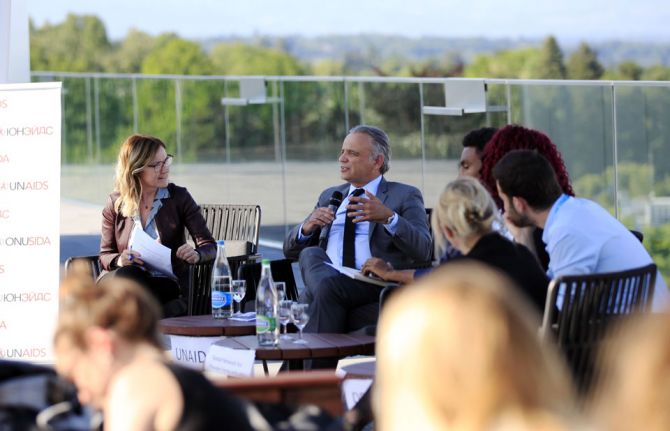
Update
Young people demand sexual and reproductive health and rights information
25 May 2017
25 May 2017 25 May 2017Sexual and reproductive health and rights information, education and evidence-informed data are key to ensuring that young people know how to protect themselves from HIV and access HIV testing and treatment. This was the main message from an event—Breaking Down Barriers to Youth Empowerment—organized by the Permanent Mission of Denmark to the United Nations in Geneva and UNAIDS and held on 24 May, on the sidelines of the 70th World Health Assembly.
The event provided a platform for young people to be at the centre of the discussion, with a call to double efforts in scaling-up and ensuring adequate access to quality sexual and reproductive health and rights information.
The participants noted that access to clear, accurate and evidence-informed information and education supports the capacity of young people to protect their health, rights and dignity and to stand up to discrimination and violence. It also serves as a critical stepping stone for accelerating socioeconomic growth and progress. Yet, there are major barriers and challenges that must be addressed.
In many settings, access to sexual and reproductive health and rights information is constrained by legal and policy barriers, such as parental consent requirements for adolescents and youth to access services, including HIV testing. In countries with high levels of early and forced marriage, spousal consent requirements also put young women and girls at increased risk of HIV infection.
The participants concluded that limited access to accurate, high-quality, evidence-informed information, education and data on sexual and reproductive health and rights jeopardizes young people’s health and survival.
Quotes
“Youth face the greatest health barriers. Only by and with the meaningful engagement of healthy citizens can we unleash the full potential of the world’s largest youth generation and build healthy, prosperous and sustainable societies that drive progress and development now and for the future.”
“Youth engagement, reinforced by sexual and reproductive health and rights advocacy and a strong evidence base, are the keys to a progressive future. In response to existing global health barriers, young people across the world should be empowered to challenge the status quo.”
“Information on sexual and reproductive health and rights saves lives. The more constraints young people face in accessing information, the more we risk an upsurge of new HIV infections, AIDS-related deaths and HIV-related stigma and discrimination.”
Related
 “Who will protect our young people?”
“Who will protect our young people?”

02 June 2025

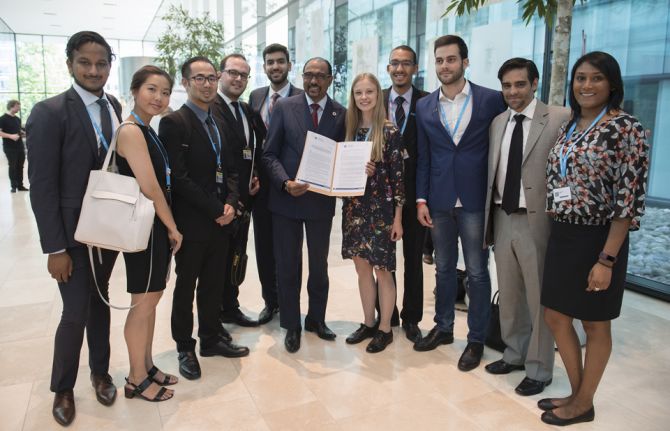
Update
Medical students commit to eliminating discrimination in health care
24 May 2017
24 May 2017 24 May 2017The International Federation of Medical Students’ Associations (IFMSA), meeting in Geneva, Switzerland, ahead of the 70th World Health Assembly, has launched a Declaration of Commitment to Eliminate Discrimination in Healthcare Settings.
During the meeting, which took place from 17 to 21 May, medical students, young people living with HIV and young key populations discussed the ongoing challenges that young people face in the context of discrimination in health-care setting and identified potential areas of collaboration.
The declaration, which endorses the UNAIDS Agenda for Zero Discrimination in Health-Care Setting, calls on governments, civil society and other partners to work together for non-discrimination and reaffirms IFMSA’s work in strengthening partnerships with young people living with HIV and young key populations.
The declaration will evolve into a memorandum of understanding between IFMSA and youth organizations and networks working on HIV to define specific activities to contribute to the elimination of discrimination in health-care settings.
Quotes
“The doctors of tomorrow have a key role to play in transforming health-care settings into spaces of inclusion and zero discrimination. We need the leadership of medical students to responding to the root causes that keep people from accessing services.”
“Medical students and the future health workforce need to be ready, not only to provide non-stigmatizing and free of discrimination care, but also to partner with those most affected by the HIV epidemic, act together and create an empowering movement that can serve as a platform to achieve the Fast-Track Targets.”
“One of the main challenges for young people when they are accessing services is the attitude of health-care providers. That is what makes the collaboration between young people living with and affected by HIV and medical students so important to us. We can proactively work together to support adolescents and young people to request and receive services that directly meet their needs and that are free of judgement and discrimination.” Cedric Nininahazwe, READY+ Regional Project Manager, Y+
Related information
Related
 “Who will protect our young people?”
“Who will protect our young people?”

02 June 2025


Update
Young people ready to #uproot the structural causes that put them at risk
23 May 2017
23 May 2017 23 May 2017The PACT, a coalition supported by UNAIDS of more than 25 youth organizations and networks working on HIV, has launched a youth-led political campaign to respond to the barriers that put young people at risk of HIV.
Launched through a Twitter chat at the World Health Assembly, #uproot is a campaign running until the end of 2020 that is developed and powered by and for young people everywhere. It aims to increase the visibility of the root causes of risk and vulnerability, including inequities, violence, exclusion and stigma and discrimination, that jeopardize young people’s health, access to HIV and sexual and reproductive health services and rights and the sustainability of the AIDS response.
The campaign will focus its efforts on three strategic areas—challenging harmful legal and policy barriers that deter young people from accessing services, supporting youth participation in the HIV response and strengthening innovative partnerships between networks of young people.
Among the activities planned for this year, #uproot will develop scorecards on the progress achieved by countries on the issues that matter and affect young people the most, crowdsource recommendations to inform the design of youth-friendly HIV and sexual and reproductive health services, map and support youth participation in community responses and establish strategic alliances with medical students and parliamentarians and between youth networks from different countries and regions.
Quotes
“It is high time that as young people we streamline our advocacy everywhere in the world to ensure our meaningful engagement. #Uproot will not only bring together young people for unified advocacy but also rally other partners and donors to achieve a common goal.”
“When young people all over the world are still fighting to participate and be listened to, it’s important to have strong, consistent messages about what we need. #Uproot is a chance to show that we’re being left behind, and this isn’t an accident—it’s because of political choices on who and what to invest in, and because of stigma and fear around young people’s sexuality.”
“Violence, discrimination, stigma and exclusion keep putting young people at risk of HIV, and these barriers are fuelled by silence and indifference. When we pay attention and respond to these barriers together, we contribute to more inclusive societies and the sustainability of the AIDS response.”
Related

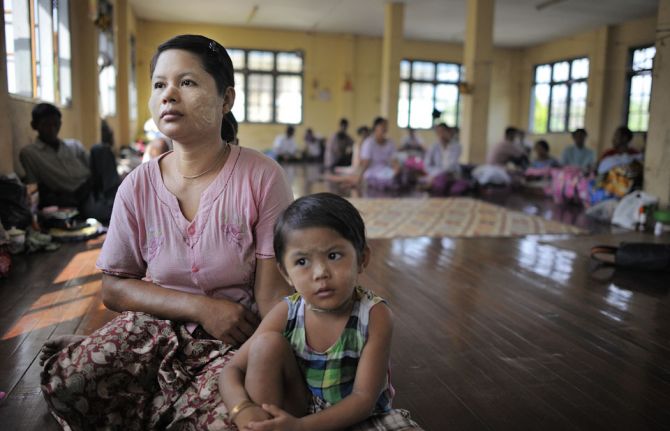

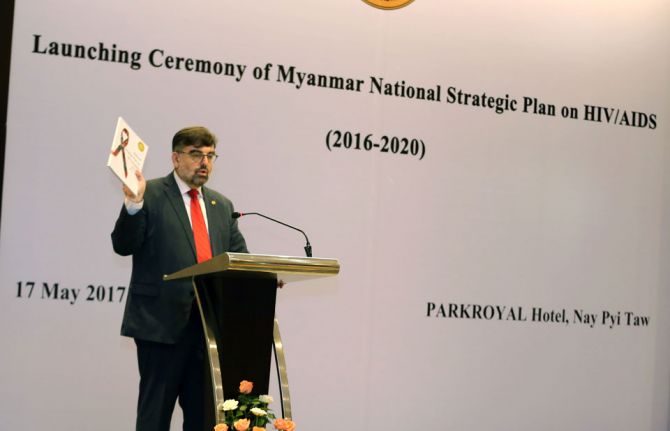
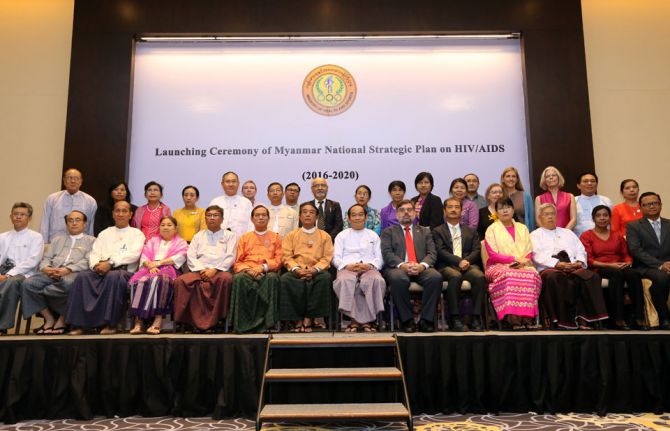

Update
Myanmar launches new HIV strategic plan
19 May 2017
19 May 2017 19 May 2017The Ministry of Health and Sports of Myanmar launched the country’s latest five-year HIV plan on 17 May. The plan provides a road map on how to Fast-Track the national HIV response and end the AIDS epidemic as a public health threat by 2030.
Myanmar is one of the 35 countries accounting for 90% of new HIV infections globally. The new plan adapts global Fast-Track Targets to the local context to ensure an effective, cost-effective and high-impact HIV response. Locations are prioritized based on their HIV epidemic and risk of new HIV infections and service delivery approaches are tailored to reach priority populations and speed up access to services.
The ambitious plan aims to ensure the 90–90–90 targets—whereby 90% of people living with HIV know their HIV status, 90% of people who know their HIV-positive status are accessing treatment and 90% of people on treatment have suppressed viral loads—are met by 2020. The plan also aims to ensure that 90% of key populations access HIV prevention services and that 90% of people living with and affected by HIV report zero discrimination, especially in health, education and workplace settings.
During the launch, the Union Minister of the Ministry of Health and Sports, Myint Htwe, stressed the importance of translating the plan’s strategies into action.
Quotes
“All of us sitting in this room, together with Ministry of Health officials, should do our level best, within the capacity and capability that we have. I will also render all out support in running this programme successfully during my tenure as the Minister of Health.”
“Over the past years, we have seen tremendous progress in Myanmar’s national HIV response owing to the combination of focused efforts in prevention and treatment services. This new strategic plan will help propel the country faster towards its Fast-Track Targets.”
Region/country


Update
G20 health ministers to discuss global health challenges
18 May 2017
18 May 2017 18 May 2017Ministers of health of the Group of Twenty (G20) member countries will meet for the first time in Berlin, Germany, on 19 and 20 May to discuss a coordinated global response to global health challenges. The G20 member countries are focusing on global health for the first time, reaffirming their commitment to translating the 2030 Agenda for Sustainable Development into practice in the health and development sectors.
Health is key to the three main pillars of Germany’s G20 presidency—building resilience, improving sustainability and assuming responsibility.
Global health concerns, such as infectious disease outbreaks and antimicrobial resistance, will be the main topics of discussion, given their severe impact on the lives and well-being of millions of people as well as on the global economy. The G20 health ministers will focus on the need for strengthening health systems to ensure healthy populations, underpin strong economies and safeguard against disease outbreaks with pandemics.
Collective action and sustained leadership will be needed to address critical global health issues, including ending AIDS as a public health threat by 2030. The G20’s role will be pivotal to developing concerted action to address HIV in G20 countries—where 15.4 million people are living with HIV and nearly a million became newly infected with HIV in 2015—as well as championing global solidarity to accelerate progress globally. Currently, G20 countries provide 84% of the total official development assistance for AIDS in low- and middle-income countries.
Investing in the AIDS response will have a multiplier effect on G20 priorities as it will spur progress on tuberculosis, strengthen health systems, create jobs and drive results across the Sustainable Development Goals.
Resources
Related

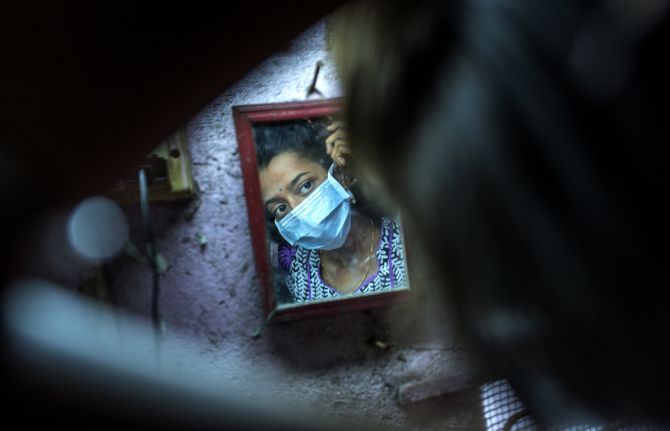
Update
Reaching the missing millions
17 May 2017
17 May 2017 17 May 2017In the past decade, there have been extraordinary leaps in medical technology that have the potential to save lives by dramatically improving the diagnosis and treatment of tuberculosis (TB) and HIV—two of the leading causes of death globally. More remarkable, perhaps, is the fact that these new tests and treatments are available and affordable in almost every country of the world through concerted global efforts to reduce prices.
However, there are millions of reasons why it is too early to celebrate success—the missing millions who are not being reached by HIV and TB services. UNAIDS estimates that in 2015 there were more than 18 million people living with HIV in need of access to life-saving medicines to treat HIV.
More than 10 million people developed TB disease in 2015—only 60% were diagnosed and treated.
Around 400 000 people die from HIV-associated TB every year, including 40 000 children.
New tests have reduced the time to diagnose drug-resistant TB from two months to a matter of hours. Even when effective testing and treatment services for HIV and TB are available free of charge, though, the barriers to accessing them are insurmountable for many of the people who need them most.
“The missing millions are hidden among the world’s poorest, most marginalized populations, such as refugees, sex workers, prisoners, people who use drugs, migrants and people who move to cities in search of a better life and end up in informal settlements, left behind by health and social services,” said Michel Sidibé, Executive Director of UNAIDS. “Many barriers, including lack of transport, poor education, stigma and discrimination, criminalization and food insecurity, prevent them benefiting from the effective tests and medicines that are freely available today, far less the new technologies of tomorrow.”
UNAIDS, the World Health Organization and other global technical partners and donors are discussing how to overcome these barriers to reaching the missing millions at the Stop TB Partnership board meeting, taking place in Berlin, Germany, on 17 and 18 May.
“Our current problem is not the lack of effective tools, policies and guidelines to treat and prevent tuberculosis and HIV, it is how to turn policies into actions. We need the implementation part: concrete actions to be put in place and scaled up to save the lives of millions of people and guarantee an end to the global epidemics of tuberculosis and HIV,” said Lucica Ditiu, Executive Director of the Stop TB Partnership.
Our window of opportunity to end the global epidemics of AIDS and TB is shrinking. Health and development priorities are shifting and complacency is setting in. Our global failure to reach the people most in need with the basic services they need to prevent, diagnose and treat TB and HIV enhances the development of drug resistance, which could render TB and HIV untreatable.
UNAIDS is working with partners to reduce TB-related deaths among people living with HIV by 75% by 2020, as outlined in the World Health Organization End TB Strategy, as well as the targets set in the Stop TB Partnership’s Global Plan to End TB 2016–2020, to achieve the 90–90–90 targets to reach 90% of all people who need TB treatment, including 90% of populations at high risk, and achieve at least 90% treatment success, including through expanding efforts to combat TB, including drug-resistant TB.













